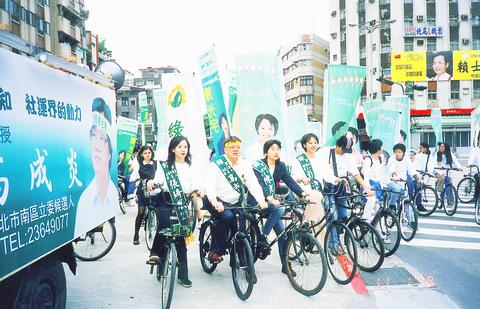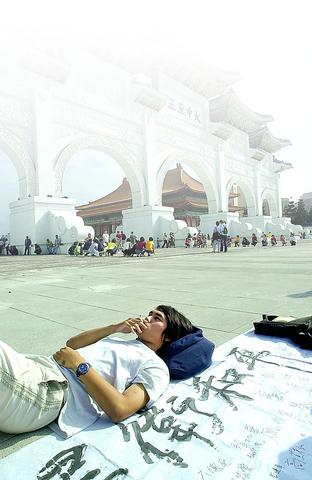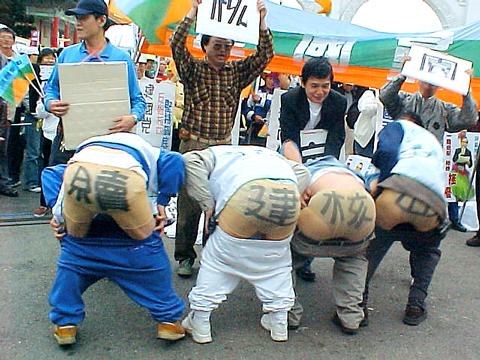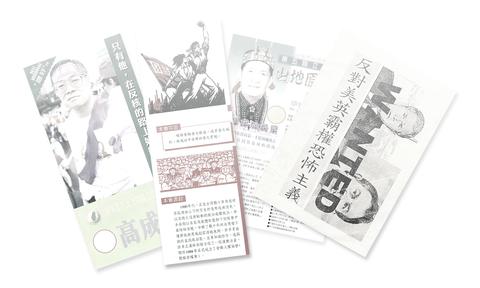When the Labor Party held a protest against the US-led strikes on Afghanistan on Oct. 20 at CKS Memorial Hall in Taipei about 20 people showed up. Some were in the crowd as part of the half dozen other groups that helped to organize the march.
For the Labor Party (
"People may shake their heads, but that's not going to stop us from going out onto the street to make our point," said Lin Shu-yang (

PHOTO COURTESY OF GREEN PARTY
Getting the message out and doing so as loudly as possible, and ideally getting on TV in the process, is the primary objective for most of Taiwan's small fringe parties, which face a quixotic battle for exposure. Few people are aware that, along with the DPP, KMT, PFP, New Party and the Taiwan Solidarity Union, there are 92 other official political parties and groups which nominate candidates in national and local elections in Taiwan. Dozens will be taking part in the elections on Dec. 1.
Some have names that seem hopelessly confining, such as the China Old Veterans Unification Party (中國老兵統一黨) or the Chinese Minorities Justice Party (中國少數民族正義黨), and many are single-person operations, like the China Women's Party (中國婦女黨) headed by Wu Hsin-ren (吳心人). Other parties are suspected of serving merely as fronts for tax evasion, because parties, as organizations that exist ostensibly to serve the public interest, are not taxed.
On the margins

Though the number of parties is high, the figure is deceptive, according to Chuang Kuo-hsiung (
Chuang suspects that a large number of the parties no longer exist and simply have not gone through the process of official de-registration. To do so requires an observer from the MOI as a witness to attend an official party conference to announce the dissolution of a party, and in many cases, Chuang said, there are no people left in the party to hold a conference. Parties are automatically de-listed, however, when they do not propose candidates in two successive rounds of elections, a period which can last up to eight years.
There are currently scores of active parties with platforms that cover the spectrum of social, political and economic ideologies from the Natural Law Party (

PHOTO: COURTESY OF TIP
The majority of parties registered with the MOI in 1989 immediately following the lifting of martial law, which had forbidden the founding of all rival political entities to the KMT.
When the Political Organization Law was amended, the only regulations limiting the registration of political parties were two articles that prohibited the founding of parties of which the express purpose of the organization is formal independence for Taiwan or the establishment of communism in Taiwan. But even these two articles are ignored 11 years after their implementation. "Basically, anything goes," Chuang said.
Pointing to the flurry of political activism in the late 1980s, MOI records show that 52 political parties were founded in 1989 and 1990 alone. Other events, such as the run-up to the 1996 elections, saw a spike in the founding of parties as well, including the Natural Law Party, the Green Party (

PHOTO: AP
But with the exception of the Greens and the TIP, which managed to garner 0.089 percent and 1.5966 percent respectively of the national vote in elections in 1998, Taiwan's small parties remain conspicuous in their absence from the political stage and public political discourse.
"Taiwan's fringe parties exist on the periphery of the political establishment because ultimately they offer few things which the major parties do not already offer," said Jim Lee (
The smaller parties, he said, are faced with a situation in which the political arena is monopolized by so-called "catch-all" establishment parties -- the DPP, KMT, the recently formed PFP and Lee Teng-hui's (
"The DPP, for example, when it was the opposition, claimed to be the party of the working class and co-opted most of the issues pertinent to the workers' movement. The KMT has done the same, trumpeting its record among workers, now that it's the opposition," Lee said.
"This is Taiwan's form of centrist politics -- avoidance of potentially divisive social issues to appear more moderate and appeal to more people."
Most of the country's smaller parties do not hold aspirations of becoming the nation's governing party. They are explicitly and purposely limited in their appeal, but are motivated by their sometimes idiosyncratic political beliefs.
Isaludao (
"This is a fight I must lead for the dignity of my people and the honor of my ancestors," he said. "This is fundamentally about getting respect for Aborigines in Taiwan, who were robbed of their land and their rights by the KMT in the past and now by the DPP." In the 1998 elections, his party received 0.0129 of the national vote, with 1,171 votes. This time Isaludao anticipates receiving up to 8,000 votes, which he predicts would suffice to get him into the legislature in this year's elections.
System restrictions
In Taiwan's election system, voters cast a vote for an individual candidate in a district, with up to several dozen contested legislative seats. The legislative seats are then distributed to the candidates who garnered the largest number of total votes. With the PFP and TSU joining the race in these elections and likely siphoning off votes from the DPP and KMT, the bar for becoming elected has been remarkably lowered This has opened the door to smaller parties, but only slightly. Small parties are perpetually hounded by financing problems that limit their ability to publicize their candidates.
For this reason, free photo-ops like the Labor Party's flag burning in front of AIT are essential to expanding small parties' name recognition.
The Green Party, which derives most of its support from among the urban middle-class, is running its current campaign with two candidates on a tiny budget of about NT$300,000.
Kao Cheng-yan (
The smaller parties' campaigns are almost comically threadbare compared with the major parties' elaborate operations. At a rally for Kao in Wanhua last Saturday, about 12 people sat on plastic stools on the sidewalk of Yenping North Road nibbling on vegetarian pastries and struggling to hear speakers over the din of traffic.
In contrast to the spartan nature of the Greens' campaign, the large parties spend hundreds of millions of New Taiwan dollars on their campaigns, which often include TV ads, rallies at soccer stadiums and fleets of broadcasting trucks, one procession of which drowned out Kao's speech at one point. "We have a market in Taiwan, but too few resources. There's almost no way to compare our ability to mount a campaign to the large parties," Kao said.
Citing a similar lack of funds to carry out a successful campaign, the Labor Party opted to not nominate a candidate in this round of elections. It nonetheless plans to use the campaign season to tour the country to stage rallies and boost its name recognition.
Financing problems, scant media exposure, public indifference and shortages of resources are not uncommon for fringe parties, whether in Taiwan or elsewhere, but Lee of Chengchi University says the biggest obstacles for these parties are their rigid ideologies on the pivotal issue of independence or unification.
"These parties undermine their appeal by taking strong stands for or against unification. Every poll has shown that people prefer to maintain an ambiguous and flexible position on this issue." The Labor Party, however, will not waver on the issue of unification. "We should reunite immediately. Unification is the only way to improve the economy, unite the people and end the legacy of Taiwan existing as a fiefdom of the imperialist US," Lin said.
On the other end of the scale, the TIP advocates formal independence as the only way to "save Taiwan," despite Beijing's numerous public threats of military action against the island in the event of a declaration of independence.
These kinds of positions are why Joseph Wu (
"Fifty years of the KMT haranguing people about the evils of communism have left people with little appreciation of non-mainstream political values, particularly leftist politics. But that may change now," he said.
Events such as the controversy over the 84-hour work fortnight and the halting and then resuming construction on the Fourth Nuclear Power Plant have the potential to force debate on social issues that could ultimately benefit fringe parties.
The Greens see themselves as the most likely to receive a windfall from people's growing concerns over environmental problems. "People are beginning to feel very strongly about the state of the environment, and when they see the DPP's mishandling of [the Fourth Nuclear Power Plant] they may be drawn to our stance which is clear and unbending," said Lai Fen-lan (
Perhaps, says Wu. But the salient issues in the current elections remain the economy, fighting corruption and the issue of independence versus unification, which the small parties have neither the will nor the ability to tackle, he said.
So the fringe parties continue their struggle on the sidelines of mainstream politics with varying degrees of expectation of expanding their appeal and power.
"Of course we're not going to run the country. It's already been stolen from us. But at the minimum, we have make sure our voice is heard," Isaludao said last week as he jumped into his beat-up chauffered Daihatsu for a campaign meeting in Wulai, Taipei County.

Last week the story of the giant illegal crater dug in Kaohsiung’s Meinong District (美濃) emerged into the public consciousness. The site was used for sand and gravel extraction, and then filled with construction waste. Locals referred to it sardonically as the “Meinong Grand Canyon,” according to media reports, because it was 2 hectares in length and 10 meters deep. The land involved included both state-owned and local farm land. Local media said that the site had generated NT$300 million in profits, against fines of a few million and the loss of some excavators. OFFICIAL CORRUPTION? The site had been seized

Next week, candidates will officially register to run for chair of the Chinese Nationalist Party (KMT). By the end of Friday, we will know who has registered for the Oct. 18 election. The number of declared candidates has been fluctuating daily. Some candidates registering may be disqualified, so the final list may be in flux for weeks. The list of likely candidates ranges from deep blue to deeper blue to deepest blue, bordering on red (pro-Chinese Communist Party, CCP). Unless current Chairman Eric Chu (朱立倫) can be convinced to run for re-election, the party looks likely to shift towards more hardline

Sept. 15 to Sept. 21 A Bhutanese princess caught at Taoyuan Airport with 22 rhino horns — worth about NT$31 million today — might have been just another curious front-page story. But the Sept. 17, 1993 incident came at a sensitive moment. Taiwan, dubbed “Die-wan” by the British conservationist group Environmental Investigation Agency (EIA), was under international fire for being a major hub for rhino horn. Just 10 days earlier, US secretary of the interior Bruce Babbitt had recommended sanctions against Taiwan for its “failure to end its participation in rhinoceros horn trade.” Even though Taiwan had restricted imports since 1985 and enacted

The depressing numbers continue to pile up, like casualty lists after a lost battle. This week, after the government announced the 19th straight month of population decline, the Ministry of the Interior said that Taiwan is expected to lose 6.67 million workers in two waves of retirement over the next 15 years. According to the Ministry of Labor (MOL), Taiwan has a workforce of 11.6 million (as of July). The over-15 population was 20.244 million last year. EARLY RETIREMENT Early retirement is going to make these waves a tsunami. According to the Directorate General of Budget Accounting and Statistics (DGBAS), the